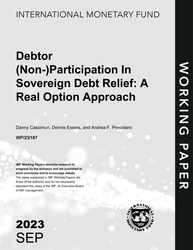
Debtor (Non-)Participation in Sovereign Debt Relief: A Real Option Approach
Debtor (Non-)Participation in Sovereign Debt Relief: A Real Option Approach
READ MORE...
Volume/Issue:
Volume 2023
Issue 187
Publication date: September 2023
ISBN: 9798400248504
$20.00
Add to Cart by clicking price of the language and format you'd like to purchase
Available Languages and Formats
| English |
Prices in red indicate formats that are not yet available but are forthcoming.
Topics covered in this book
This title contains information about the following subjects.
Click on a subject if you would like to see other titles with the same subjects.
Exports and Imports , Economics- Macroeconomics , Money and Monetary Policy , Economics / General , Sovereign debt , Sovereign debt relief , Debt Service Suspension Initiative , Common Framework , Real options , Survival analysis , debt relief initiative , participation option , IMF working paper 23/187 , option framework , debt treatment , Debt relief , Debt service , Debt sustainability , Debt restructuring , Credit ratings , Global
Summary
Developing countries have recently proved reluctant to participate in sovereign debt moratoria and debt relief initiatives. We argue that debtors' (non-)participation decisions can be understood through the lens of real options. Eligible countries compare the net benefits of participating in a debt relief initiative now with the value of waiting to potentially execute their participation option later, when they may have more information on the benefits and costs. We corroborate the real option framing with anecdotal evidence and through a survival analysis that exploits cross-country and time variation in the requests to participate in the Debt Service Suspension Initiative (DSSI), which provided temporary debt moratoria during the COVID-19 pandemic. Structured along the policy levers suggested by the real option framework, we discuss a number of ways in which participation in debt relief initiatives can be made more attractive to debtor countries.
Copyright © 2010 - 2026
Powered by:
AIDC



